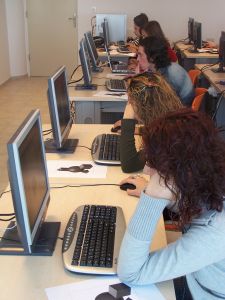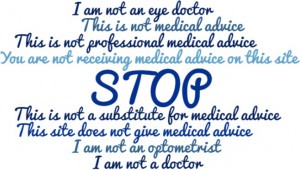There is no denying that in the past few decades, the world has been drastically changed by computers at home, school and in the workplace. Nowadays it is not uncommon to spend several hours a day staring a some sort of digital device. For many, this does not come without some feeling of guilt for ‘ruining our eyes’. There is definitely a notion out there that being at the computer is bad for your eyes. But why is this in everyone’s head? And to what extent is this true? This article will explore this topic.
I am not a doctor and this article is not a substitute for professional medical advice. Please read Contacts Advice Terms of Use before continuing.
The Claim
The claim that many parents are making to their kids, and that many adults believe applies to themselves as well, is that if they spend too much time at the computer, their vision will get worse. It’s sometimes a little tricky to discern exactly what people are thinking because the term ‘vision’ on its own is very vague and broad. But in this case, most people believe that spending too much time at a computer will cause their prescription for glasses to become stronger.
What Does Being At a Computer Do To The Eyes?
 To understand this we only need to understand one thing, and that’s how the eye adjusts to keep the vision clear at all distances. Have you ever noticed (assuming you’re wearing your glasses, or that you don’t need glasses) that whether you’re looking down the street at a road sign, or you’re reading a text on the phone in your hands, that the vision is clear? You may be thinking ‘well yeah, why wouldn’t it be?’. But there’s actually a lot that’s going inside your eyes in order to make this happen.
To understand this we only need to understand one thing, and that’s how the eye adjusts to keep the vision clear at all distances. Have you ever noticed (assuming you’re wearing your glasses, or that you don’t need glasses) that whether you’re looking down the street at a road sign, or you’re reading a text on the phone in your hands, that the vision is clear? You may be thinking ‘well yeah, why wouldn’t it be?’. But there’s actually a lot that’s going inside your eyes in order to make this happen.
Basics of Focusing
Inside your eyes is a system that consists basically of a muscle, called the ciliary muscle, and a lens, called the crystalline lens. The ciliary muscle is attached to the crystalline lens and can change the amount of focus the lens delivers by applying tension to it. The exact mechanics of how this system works are complicated, but it’s only important to know that when the eye is looking up close (within arm’s length), it requires MORE focusing power from the crystalline lens, which requires the MORE effort from the ciliary muscle. Conversely, when the eye is looking in the distance, less focusing power is required, and the ciliary muscle is relaxed.
Overdoing it
This means that when you are looking at your computer screen (or at anything else generally within arms length), the ciliary muscle is contracted (activated). If this goes on for a short period of time the ciliary muscle will not get too tired and will recover quickly. If this goes on hours and hours on end, the ciliary muscle will become exhausted and you will feel what’s called eyestrain.
Eyestrain can make your eyes feel tired, sore, and dry. It can cause them to turn red, and to water. It can give you a headache, and yes, it can cause your vision to be blurry. However, these are all temporary symptoms and in general after a good night’s rest, the ciliary muscle will have recovered and the symptoms should be gone. The real question is, does it cause your prescription for glasses to get worse?
Can Being at a Computer Make Your Prescription Worse?
I will answer this question in two parts.
Adults
First, lets consider this question for adults. The answer is that for the vast majority of adults, being at a computer for too long will not cause your prescription to change. It can and will cause all of the symptoms of eyestrain discusses above, but if you’re past you mid 20’s, this will not affect your prescription. Why? Because your prescription is basically a result of the ratio between the overall length of the globe (your eyeball) compared the overall focusing strength of the optical elements of your eyes (namely the cornea and the crystalline lens). Eyestrain can cause temporary changes in the ability of your crystalline lens to focus (hence temporary blur can ensue), but no permanent changes to either the crystalline lens, the cornea, or the overall length of the eye are taking place.
too long will not cause your prescription to change. It can and will cause all of the symptoms of eyestrain discusses above, but if you’re past you mid 20’s, this will not affect your prescription. Why? Because your prescription is basically a result of the ratio between the overall length of the globe (your eyeball) compared the overall focusing strength of the optical elements of your eyes (namely the cornea and the crystalline lens). Eyestrain can cause temporary changes in the ability of your crystalline lens to focus (hence temporary blur can ensue), but no permanent changes to either the crystalline lens, the cornea, or the overall length of the eye are taking place.
Youth
Secondly, for children and teens. For this age group the claim may actually be true. Children’s and teenagers’ eyes (much like the rest of their bodies) are very susceptible to growth spurts. If their eyes suddenly start to grow too fast it will cause an optical imbalance in the eyes and they will become near sighted (myopic). Researchers still do not know the exact cause for why the eyes do this, but certain things are known.
- Genetics play a role. If a parent of the child is nearsighted, the risk of the child becoming nearsighted increases. If both parents are nearsighted, the risk is even higher.
- The prevalence of nearsightedness in children has been gradually increasing (dramatically) over the past several decades. This leads researchers to think that genetics are not the only thing responsible.
- It is postulated that eyestrain in children and teenagers encourages the eyes to grow longer because being nearsighted reduces the effort it requires for eyes to see up close.
 Considering that over the past few decades, we have seen a spike in nearsightedness and advances in technology has led us to be glued to devices that require us to look up close for prolonged periods of time, it is sensible to believe that the two are related. This is not a hard and fast rule. Contradictions to this are seen every day in some children who have perfect vision and yet spend many hours a day on a computer. But in general, a correlation does exist.
Considering that over the past few decades, we have seen a spike in nearsightedness and advances in technology has led us to be glued to devices that require us to look up close for prolonged periods of time, it is sensible to believe that the two are related. This is not a hard and fast rule. Contradictions to this are seen every day in some children who have perfect vision and yet spend many hours a day on a computer. But in general, a correlation does exist.
Summary
I like to think of it this way. Although it is unclear what the exact causes of nearsightedness are, the effects are generally irreversible. Once you become nearsighted it is very unusual for it go to away on its own. For that reason, it makes sense to use what we do know to try to prevent it from happening. Sometime it may not work (after all, we cannot control the genes we were born with), but if we can limit the amount of computer use now, in order to prevent a lifetime’s worth of nearsightedness, that’s worth the effort to me. This applies mostly to children and teenagers of course. Adults should be following the same advice too, if not just to set a good example, then to prevent eyestrain, which may not cause permanent change but is still something that can really negatively affect your quality of life.
But parents! Don’t go overboard with this. Look at the world your children live in. They need to familiarize  themselves with technology. Let them use the computer, their tablets and their phones, but limit the amount of time they are these devices. The overall number of minutes spent in a day is not as important as the number of consecutive minutes spent at these devices. If they have been at it for 20-30 minutes, let know know it’s time for a break and encourage them to do activities that will allow their eyes to roam around. After a 20-30 minute break the ciliary muscle will be relaxed and ready for another 20-30 minutes session, and so on.
themselves with technology. Let them use the computer, their tablets and their phones, but limit the amount of time they are these devices. The overall number of minutes spent in a day is not as important as the number of consecutive minutes spent at these devices. If they have been at it for 20-30 minutes, let know know it’s time for a break and encourage them to do activities that will allow their eyes to roam around. After a 20-30 minute break the ciliary muscle will be relaxed and ready for another 20-30 minutes session, and so on.
Do you have children who spend hours a day at a computer or tablet? Do you yourself use a computer at work and spend the majority of your day at it? I’d love to hear your experience with this! Drop a comment or ask a question in the comments section below :)





10 Responses
Phil Martin
Very helpful post, I sit at a computer all day every day and I’ve often wondered how it would affect my eyes. I don’t wear glasses, but I guess I should get my eyes tested after reading this.
Thanks
Julie
Hi Phil!
I’m glad to hear that you don’t need glasses! You are living proof that spending lots of time on a computer doesn’t guarantee you will have vision problems, but if you overdo it, don’t be surprised if your eyes start to feel tired and strained :p
A good way to avoid eyestrain when you’re at the computer for a long time is to take quick breaks often to let your eyes relax.
Thanks for reading :)
John
Julie,
I have a nine year old that loves to sit with his lap top. I will recommend to him that he does not use it more than 20-25 minutes in a row without a break. Thanks for your information about being at he computer bad for your eyes. I will make him read this when he gets home from school.
John
Julie
Hi John!
The key is to strike a good balance. It will have many benefits down the road. Thanks for reading :)
Eoinmc
Glad to hear it as I spend a lot of time on the computer and though I wasn’t that terribly worried about it (that happens at a certain age – well it happened me anyway). Interesting about kids though. My son spends an awful lot of time on the computer. He has already inherited my short sightedness so he has enough on his plate where his sight is concerned. Eyesight aside, I do think some of us older folk can get too excited at times about the so-called ‘damage’ computers do to our kids. As far as I can see, they seem to be far better informed than I was at least.
Julie
Absolutely, their future will revolve around them knowing how to use computers and the internet effectively, so it is important for them. But it’s also important to remember that it’s not natural for the eyes to be glued to a screen all day, so taking breaks is important. Thanks for the comment :)
David
Hey Julie. A very interesting post indeed!
My three year old daughter is very much attached to our iPad :) I do sometimes think she spends too much time on it in one go and needs to rest her eyes a while. Eyes are a huge part of our world and we need to do all we can to take care of them.
Good work Julie :)
Julie
Hi David!
Tablets are extremely popular with toddlers! At age 3 the eyes are changing very quickly, so a good balance is important. Thanks for reading :)
Peter
Thanks for another intelligent, useful article Julie. Yes, of course kids need to get used to technology as early as possible but it’s also good to be aware of potential problems with eyesight (as well as posture) and limit computer time accordingly.
Peter
Julie
Hi again Peter!
Yes, you’re right. Posture is something I didn’t touch on in the article, but it’s definitely something to consider now that so many more of our daily tasks involve sitting at a desk. Thanks for reading Peter :)